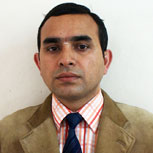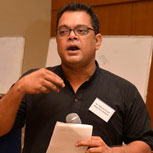The International Centre for Integrated Mountain Development (ICIMOD) has signed agreements with four strategic partners – Megh Pyne Abhiyan (MPA), The Centre for Ecology Development and Research (CEDAR), The Mountain Institute (TMI)-India, Practical Action-South Asia Office, and LEAD-Pakistan for collaboration with HI-AWARE in pilot projects, field research, co-production of knowledge products, and policy-practice engagement at various levels.
Dr Gehendra Gurung, Head of Disaster Risk Reduction and Climate Change Programme, Practical Action South Asia Office; Dr Ghanashyam Sharma, Programme Manager, TMI India; Dr Vishal Singh, Fellow & Coordinator, CEDAR; Mr Eklavya Prasad, Managing Trustee, MPA; and Mr Basharat Ahmad Saeed, Coordinator of the Climate Change Programme, LEAD-Pakistan have been identified as the focal points for their respective organisations for collaboration with HI-AWARE.
Their profiles follow.
Gehendra B Gurung, Head of Programme: Disaster Risk Reduction (DRR) Climate Change, Practical Action South Asia Office

Educated in Nepal and the UK in Agriculture, Dr Gehendra Gurung started his professional work with Care International in Nepal in 1986. He then joined the Lumle Agriculture Research Centre in Nepal in 1987, which is one of the leading agriculture research centres in the country. He led some of the research programmes in the centre on horticulture, including fruit cultivation and post-harvesting technologies. Dr Gurung then joined the then King Mahendra (current National) Trust for Nature Conservation as a senior officer for its Annapurna Conservation Area Project (ACAP) in 1993. ACAP, the first and the largest conservation area in Nepal, is rich in biodiversity and culture and is an important tourist destination in Nepal. Dr Gurung assumed the position of Director of the ACAP in his last years with the trust. Since 2005, Dr Gurung has been working at Practical Action South Asia as Head of the DRR and Climate Change programmes. Practical Action, with its head office in the UK, is one of the lead organisations in Nepal in initiating climate change field adaptation works, starting in 2005. Since then, it has undertaken a number of adaptation initiatives in Nepal and has been involved in supporting the government of Nepal in policy formulation and studies related to climate change.
Dr Gurung is the focal point in Practical Action for the HI-AWARE project in Nepal. As the focal person of the project, he will help in assessing the needs for climate change adaptation at the community and policy levels. He will also help with stakeholder identification, research, studies on the ground and at the policy level, and in preparing reports out of the learning.
He can be reached at: Gehendra.gurung@practicalaction.org.np
Ghanashyam Sharma, Programme Manager, The Mountain Institute India
Dr Ghanashyam Sharma has been the Programme Manager of The Mountain Institute India (TMI India), based in Gangtok, Sikkim, India since 2008. He holds a master’s degree in Botany and a PhD in Agricultural Ecology from the GB Pant Institute of Himalayan Environment and Development, a national research and development organisation in India, where he also worked as a Research Associate until 2000. Dr Sharma joined WWF India as a Senior Programme Officer in 2001 in its Sikkim State Office, under the Eastern Himalayan Biodiversity Hotspots initiative. In 2005, Dr Sharma was selected and appointed as a JSPS-UNU Postdoctoral Fellow to undertake a two-year research on Mountain Agrobiodiversity and Sustainable Land Management in the United Nations University, Tokyo, Japan. At the time, Dr Sharma was also involved in UNU’s global project ‘Peoples, Land and Environment Change’, which worked in the eastern Himalayas and in the south-east Asian mountainous region, including northern Japan. He was also associated with the Food and Agriculture Organization’s Globally Important Agriculture Heritage Systems (FAO’s GIAHS) initiative on Sikkim Himalayan agriculture. Currently, Dr Sharma has been nominated in five State Level Committees of the Government of Sikkim, including the Sikkim State Biodiversity Board and Sikkim State Board for Wildlife. Dr Sharma has more than 15 years of professional experience working in biodiversity conservation, agriculture ecology, ecosystem services, climate change adaptation, traditional farming systems, community development, environmental governance and mountain culture and livelihoods in the eastern Himalayas.
In the HI-AWARE project, TMI India is both a strategic and an operational partner of ICIMOD and TERI-India. Apart from this, wherever pilot projects are initiated, TMI India will work together with the HI-AWARE team in implementing them. Dr Sharma will lead a team from TMI India to work together with the HI-AWARE team and support and coordinate in the research group’s programme covering the Teesta River basin (upstream in Sikkim, the mid-hills of Sikkim, Darjeeling and Kalimpong and downstream in Jalpaiguri) on different aspects of HI-AWARE focus areas. Dr Sharma will also act as a peer reviewer of HI-AWARE products and look at regional sensitivities, localisation of issues, factual representations etc.
He can be reached at: banstolag@yahoo.co.in
Vishal Singh, Fellow & Coordinator, The Centre for Ecology Development and Research (CEDAR)
 Dr Vishal Singh is a Fellow at CEDAR and has expertise in forest ecology and climate change. His current research interest is on studying the impact of urbanisation on ecosystem services associated with the natural infrastructure within the urban confines in the Himalayan region. He has also been keenly involved in research pertaining to climate change adaptation and mitigation strategies, particularly in rural areas with marginalised communities in the mountainous regions of the Himalaya. He has been extensively involved in long-term monitoring of permanent forest plots to study the impact of climate change and small-scale chronic disturbances in the Himalayan region. His previous research engagements include forest-fire monitoring and development of allometric equations for carbon estimation and reducing emissions from deforestation and degradation (REDD).
Dr Vishal Singh is a Fellow at CEDAR and has expertise in forest ecology and climate change. His current research interest is on studying the impact of urbanisation on ecosystem services associated with the natural infrastructure within the urban confines in the Himalayan region. He has also been keenly involved in research pertaining to climate change adaptation and mitigation strategies, particularly in rural areas with marginalised communities in the mountainous regions of the Himalaya. He has been extensively involved in long-term monitoring of permanent forest plots to study the impact of climate change and small-scale chronic disturbances in the Himalayan region. His previous research engagements include forest-fire monitoring and development of allometric equations for carbon estimation and reducing emissions from deforestation and degradation (REDD).
He can be reached at: vishal@cedarhimalaya.org
Eklavya Prasad, Managing Trustee, Megh Pyne Abhiyan (MPA)
 Mr Eklavya Prasad is a practitioner who presently leads Megh Pyne Abhiyan (MPA), a grassroots public charitable trust, literally meaning Cloud Water Campaign. MPA was conceptualised and sketched by him and works in partnership with local non-government organisations; it is supported by resource institutions, researchers and volunteers. The organisation focuses on decentralised and alternative safe and secure drinking water and hygienic sanitation solutions along with participatory groundwater management, innovative farm-based livelihood options and minimising the impact of floods on human life in the flood-prone areas of north Bihar, and groundwater-based action research in the water-scarce region of Jharkhand province. However, the wider mandate is to stimulate collective action and accountability towards ‘commons’ amongst the local community. Mr Prasad has been guided by the experiences he accumulated while working on natural-resource issues in rural India for the past two decades. Apart from working at the grassroots level, Mr Prasad has been extensively writing on issues being addressed by the MPA in its workings.
Mr Eklavya Prasad is a practitioner who presently leads Megh Pyne Abhiyan (MPA), a grassroots public charitable trust, literally meaning Cloud Water Campaign. MPA was conceptualised and sketched by him and works in partnership with local non-government organisations; it is supported by resource institutions, researchers and volunteers. The organisation focuses on decentralised and alternative safe and secure drinking water and hygienic sanitation solutions along with participatory groundwater management, innovative farm-based livelihood options and minimising the impact of floods on human life in the flood-prone areas of north Bihar, and groundwater-based action research in the water-scarce region of Jharkhand province. However, the wider mandate is to stimulate collective action and accountability towards ‘commons’ amongst the local community. Mr Prasad has been guided by the experiences he accumulated while working on natural-resource issues in rural India for the past two decades. Apart from working at the grassroots level, Mr Prasad has been extensively writing on issues being addressed by the MPA in its workings.
The perceptions and actions of Mr Prasad have been guided from the experiences accumulated while working on wide-ranging rural issues (team building, skill and capacity enhancement, natural resource management, flood rehabilitation, contextual agriculture practices, localised housing, livelihood and economic development, mainstream and alternate media photo documentation), carrying out field action research, conducting monitoring and evaluation tasks in South and South East Asia and East and Central Africa, and steering grassroots implementation agencies.
Besides leading MPA, Mr Prasad has photographed the lives of countless people in rural Bihar. His images capture the complexity and beauty of the human spirit and depict the strength, determination and vivacity of a people who have to routinely survive the impacts of floods. His different frames project the character of the region and the range of experiences, from the disastrous aftermath to periods of relative normalcy, and they facilitate a more comprehensive understanding of the Bihari people’s day-to-day struggle and inner strength for survival.
MPA will collaborate with the team of HI-AWARE researchers at the grassroots as well as policy level. MPA will also pilot a mitigation strategy/ies in the flood-prone area of Pashchim Champaran. The learnings from the study will then be used in the policy space available, through its collaborative initiatives.
He can be reached at: meghpyneabhiyan@gmail.com
Basharat Ahmed Saeed, Coordinator for the Climate Change Programme, LEAD-Pakistan
 Mr. Basharat Ahmed Saeed works at LEAD-Pakistan as Coordinator for the Climate Change Programme. Prior to this he was working as a Research Fellow at the Lahore University of Management Sciences (LUMS). Between 2012 and 2015, Mr. Saeed was the coordinator of a project on Climate Change Adaptation and Food Security in Pakistan, which was a collaborative effort between LUMS and the World Wide Fund for Nature – Pakistan (WWF-Pakistan). His research focus was on the political economy and policy aspects of climate change, agriculture and water security in Pakistan. During this time he became interested in understanding climate vulnerability through the lens of socio-economic and politico-legal institutions such as property rights, water titles, inheritance, etc. At LEAD-Pakistan he aims to continue redefining and reframing technical and esoteric issues in the Climate discourse of Pakistan, so that they become inseparable from issues of basic human rights, dignity, equality and security.
Mr. Basharat Ahmed Saeed works at LEAD-Pakistan as Coordinator for the Climate Change Programme. Prior to this he was working as a Research Fellow at the Lahore University of Management Sciences (LUMS). Between 2012 and 2015, Mr. Saeed was the coordinator of a project on Climate Change Adaptation and Food Security in Pakistan, which was a collaborative effort between LUMS and the World Wide Fund for Nature – Pakistan (WWF-Pakistan). His research focus was on the political economy and policy aspects of climate change, agriculture and water security in Pakistan. During this time he became interested in understanding climate vulnerability through the lens of socio-economic and politico-legal institutions such as property rights, water titles, inheritance, etc. At LEAD-Pakistan he aims to continue redefining and reframing technical and esoteric issues in the Climate discourse of Pakistan, so that they become inseparable from issues of basic human rights, dignity, equality and security.
Mr. Basharat Ahmed Saeed’s educational background consists of an MA in War, Violence and Security from the University of Sussex and a BSc. (Hons) in Political Science and Sociology from the Lahore University of Management Sciences (LUMS). His professional training includes a one-month training at the Oxford Adaptation Academy 2014 conducted by the Global Climate Adaptation Partnership and the University of Oxford; a five-day training in Monitoring and Evaluation conducted by J-PAL and the Center for Economic Research in Pakistan (CERP); a four-day workshop on research and writing in Environmental Economics conducted by the South Asian Network for Development and Environmental Economics (SANDEE); and numerous workshops on Programme Evaluation and Data Analysis at LUMS. He has also worked as Research Supervisor for the International Growth Centre (IGC) for their project, ‘Political Violence in Pakistan: Understanding Sub-national Patterns’. His other interests include playing football and coaching school-level debate teams.
He can be reached at: bsaeed@lead.org.pk
